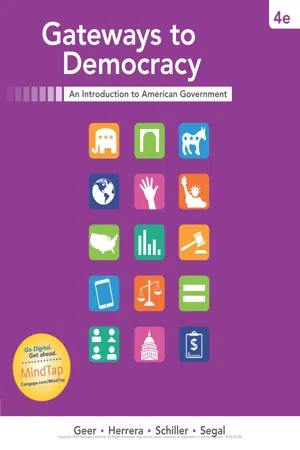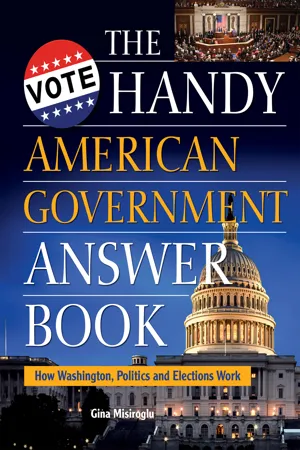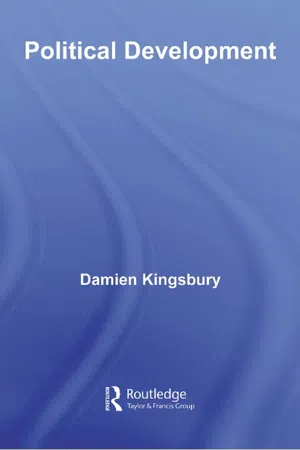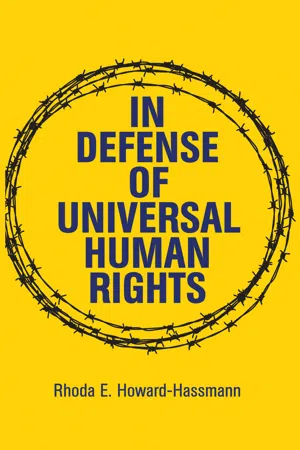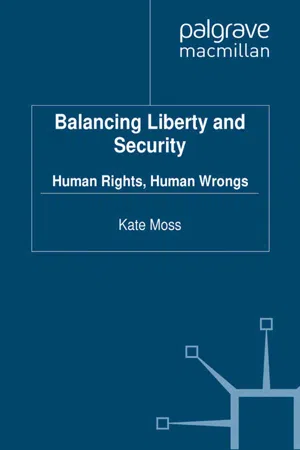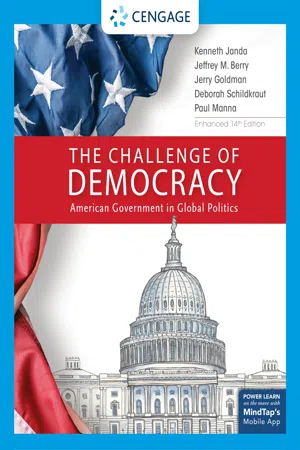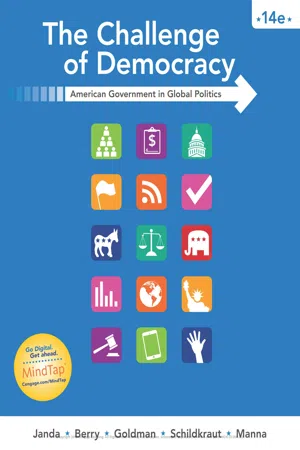Politics & International Relations
Civil Liberties vs Civil Rights
Civil liberties refer to the basic rights and freedoms that are guaranteed to individuals, such as freedom of speech and religion, and protection from government interference. Civil rights, on the other hand, are the rights that protect individuals from discrimination and ensure equal treatment under the law, such as the right to vote and the right to fair housing.
Written by Perlego with AI-assistance
Related key terms
1 of 5
8 Key excerpts on "Civil Liberties vs Civil Rights"
- No longer available |Learn more
- John Geer, Richard Herrera, Wendy Schiller, Jeffrey Segal(Authors)
- 2017(Publication Date)
- Cengage Learning EMEA(Publisher)
Civil rights are the subject of the next chapter. What Are Civil Liberties? Identify what civil liberties are 4.1 civil liberties: Those rights, such as freedom of speech and religion, that are so fundamental that they are outside the authority of government to regulate. Bill of Rights: First ten amendments to the Constitution, which provide basic political rights. natural (unalienable) rights: Rights that every individual has and that government cannot legitimately take away. Civil rights Civil liberties FIGURE 4.1 Distinction Between Civil Liberties and Civil Rights Civil liberties provide a gate or barrier that protects people against interference by the government in fundamental liberties, such as freedom of speech or religion. Civil rights often require active involvement of the government in opening gateways to full civic participation by all, regardless of race, gender, or religion. Copyright 2018 Cengage Learning. All Rights Reserved. May not be copied, scanned, or duplicated, in whole or in part. WCN 02-300 103 WHAT ARE CIVIL LIBERTIES? Balancing Liberty and Order The protection of civil liberties requires a governmental system designed to do so. James Madison argued in Federalist 10 (see the Appendix) that a representative democracy will be able to keep a minority from violating the rights of others but may not be able to hold back a majority. Thus if a majority wishes to infringe on rights, it often falls to the judiciary, which is not designed to be responsive to public desires, to protect those rights. 3 In this way, the system of separation of powers and of checks and balances would help ensure the rights of all. While maximizing individual liberty might seem like a great idea, complete liberty could lead to a breakdown of order. As Supreme Court Justice Oliver Wendell Holmes wrote in a World War I speech case, freedom of speech does not mean that an individual has the right to falsely shout “fire!” in a crowded theater and cause a panic. - eBook - PDF
- Glen Krutz, Sylvie Waskiewicz(Authors)
- 2021(Publication Date)
- Openstax(Publisher)
But what are those freedoms? And how should we balance them against the interests of society and other individuals? These are the key questions we will tackle in this chapter. 4.1 What Are Civil Liberties? LEARNING OBJECTIVES By the end of this section, you will be able to: • Define civil liberties and civil rights • Describe the origin of civil liberties in the U.S. context • Identify the key positions on civil liberties taken at the Constitutional Convention • Explain the Civil War origin of concern that the states should respect civil liberties The U.S. Constitution —in particular, the first ten amendments that form the Bill of Rights—protects the freedoms and rights of individuals. It does not limit this protection just to citizens or adults; instead, in most cases, the Constitution simply refers to “persons,” which over time has grown to mean that even children, visitors from other countries, and immigrants—permanent or temporary, legal or undocumented—enjoy the same freedoms when they are in the United States or its territories as adult citizens do. So, whether you are a Japanese tourist visiting Disney World or someone who has stayed beyond the limit of days allowed on your visa, you do not sacrifice your liberties. In everyday conversation, we tend to treat freedoms, liberties, and rights as interchangeable—similar to how separation of powers and checks and balances are often used synonymously, when, in fact, these are distinct concepts. DEFINING CIVIL LIBERTIES To be more precise in their language, political scientists and legal experts make a distinction between civil liberties and civil rights, even though the Constitution has been interpreted to protect both. We typically envision civil liberties as limitations on government power, intended to protect freedoms upon which governments may not legally intrude. For example, the First Amendment denies the government the power to prohibit “the free exercise” of religion. - eBook - ePub
The Handy American Government Answer Book
How Washington, Politics and Elections Work
- Gina Misiroglu(Author)
- 2017(Publication Date)
- Visible Ink Press(Publisher)
CIVIL LIBERTIES AND CIVIL RIGHTS DIFFERENCES BETWEEN CIVIL LIBERTIES AND CIVIL RIGHTS What are civil liberties?Civil liberties are those fundamental freedoms that together guarantee the rights of free people and protect the people from improper government actions against them. The specific rights that together make up the civil liberties of the people of the United States are written in the Bill of Rights, the first ten amendments to the Constitution. Examples of civil liberties include freedom of religion, freedom of speech, freedom of the press, and the guarantee of a fair, unbiased trial.What are substantive liberties?Some of the restraints put on the government are substantive liberties, which limit what the government shall and shall not have the power to do, including establish a religion, quarter troops in private homes without consent, or seize private property without just compensation.How do civil liberties differ from civil rights?Although these two terms are often used interchangeably, scholars generally agree that civil liberties are those liberties that protect people from the government—those that guarantee the safety of people, their opinions, and their property from the government as listed in the Constitution. The term “civil rights,” on the other hand, is generally used to refer to acts of government that make constitutional guarantees real for all people, ensuring that they receive equal treatment under the law, as outlined by the Equal Protection Clause of the Fourteenth Amendment. Landmark civil rights legislation is found in the Civil Rights Act of 1964, which prohibits discrimination based on race or sex.Does the Constitution grant Americans their civil rights and liberties?No. It doesn’t grant them, it only guarantees them. According to the Ninth Amendment, “The enumeration in the Constitution, of certain rights, shall not be construed to deny or disparage others retained by the people.” The people of America had all their rights and liberties before they wrote the Constitution. The Constitution was formed, among other purposes, to secure the people’s liberties—not only against foreign attack but also against oppression by their own government. The First Amendment to the Constitution, for example, does not give - eBook - ePub
- Damien Kingsbury(Author)
- 2007(Publication Date)
- Routledge(Publisher)
As noted at the outset of this chapter, the link between civil and political rights and political development is a basic one. One could even argue that they are but differing interpretations of or orientation of focus towards the same basic quality. That is, it is not so much that political development cannot be achieved without due regard for civil and political rights, but as a central component of political development, the presence of civil and political rights is a key marker of the extent to which political development exists.There are various interpretations of what constitutes civil and political rights, but the UN Declaration of Human Rights is the most broadly supported and widely adopted version, with the International Covenant on Civil and Political Rights having been signed by most countries, if in many cases with specific qualifications that usually pertain to constitutional or legal issues (UNTC 2002). There are a total of 30 articles outlining people’s human rights, but the central and arguably most important principles are the right to life, liberty, property and security of person(s), freedom from torture or cruel, inhumane treatment or punishment, freedom of thought, conscience and religion, and freedom of expression and opinion and assembly.The rights to life, liberty, property and security of person are at the most basic end of the scale of rights and, at first glance, say little more than each person who is alive retains the right to stay that way and to own property. This then also goes to the issue of personal security. The question of property, however, becomes more problematic, not so much at the point where it refers to simple ownership of a home or the goods for a home, or tools or other means of making a living, but where the right to property for one impinges on the right to property of others. This potential caveat applies particularly to the individual or corporate accumulation of very large quantities of property. Hence, given the capacity for competing interests, the claim to property is left intentionally ambiguous. - eBook - ePub
- Rhoda E. Howard-Hassmann(Author)
- 2018(Publication Date)
- Polity(Publisher)
Political rights are those that permit the individual to take part in the political life of the society to which she belongs. Such participation requires that citizens may make demands on governments and criticize them without fear of imprisonment, torture, or execution. It also requires that citizens can make such criticisms or demands publically through their own free speech or through the press (ICCPR, Article 19), join in associations to pursue their goals (ICCPR, Article 22), and assemble freely to decide on goals and the tactics for realizing them (ICCPR, Article 21). Freedom of speech is limited only by prohibitions on hate speech and propaganda for war (ICCPR, Article 20). Participation in political life also includes the right to vote and to take part in the government by holding political office or being part of the government bureaucracy (ICCPR, Article 25). All these rights enable citizens to be part of the political community, active contributors to, rather than mere recipients of, decisions that affect them.Civil and political rights are not merely individual entitlements: they are collective goods that permit societies to function well.3 They are the basis for civil society. They permit citizens to engage in civil discourse with each other and to engage with the state and other authorities without fear of repression or physical punishment. They permit citizens to join with one another in common causes, and to promote their causes to the wider society and the government without having to resort to threats of violence before the state will pay attention to their concerns. When states protect civil and political rights, there is usually a high level of trust both among citizens and between public authorities and the citizens they ostensibly serve. Citizens are viewed as competent members of society, whom the state should consult before making decisions or if policies need correction.In academic debates on human rights, some commentators argue that “civil and political rights have been privileged,” as opposed to economic, social and cultural, or collective human rights.4 The opposite is true, however. Critical scholars of human rights devote much time and space to the defense of economic, social and cultural, and collective human rights, while an extraordinarily taken-for-granted attitude exists toward civil and political rights, as if they are either unnecessary or so obviously protected as to be unworthy of discussion. Yet civil and political rights are strategically necessary for the realization of precisely those economic and collective human rights that critics claim are neglected in theory and practice. The poor as well as the rich, people living in the global South as well as in the West, need the voice that protection of civil and political rights allows them. Indeed, there is a positive relationship between respect for “life integrity” rights (such as freedom from torture and arbitrary execution) and achievement of subsistence (economic) rights.5 - eBook - PDF
Balancing Liberty and Security
Human Rights, Human Wrongs
- Kate Moss(Author)
- 2011(Publication Date)
- Palgrave Macmillan(Publisher)
2 Historical and Contemporary Deviations from Essential Civil Liberties 27 Nobody has an absolute right to freedom. Civilisation is the story of humans sacrificing freedom so as to live together in harmony. We do not need Hobbes to tell us that absolute free- dom is for newborn savages. All else is compromise. 1 In this chapter my aim is to trace some of the landmark historical devi- ations from the essential principles of civil liberties as established in Chapter 1. For example, those which occurred during World Wars I and II, the Northern Ireland issue and in particular the Pat Finucane case, the relevance of the Tribunal and Inquiries Act 2005 and the emer- gence of the Diplock courts. I also want to highlight certain contem- porary civil liberties issues which have arisen in relation to a number of topical areas. For example, those demonstrated by the case of Liberty and the ICCL (2008) and the Al-Skeini case involving Baha Mousa. The interesting issue here for me is that historically it could be argued that prior to the Convention on Human Rights and of course the UK Human Rights Act 1998, safeguards for preserving the balance between security and civil liberties were somewhat less than they are today. Certainly Waddington (2005) amongst others would probably argue this. The natural result of this – one would guess – would be that contempo- rary deviations from civil liberties would thus occur less frequently, or when occurring, would give rise to legal cases in which the laws pro- tecting such rights would be reaffirmed. However, I shall demonstrate that both historically and contemporaneously, the use of State force in the name of the protection of security is a common theme in the avoid- ance, ignoring or sidestepping of many civil liberties issues. In short, - No longer available |Learn more
The Challenge of Democracy
American Government in Global Politics, Enhanced
- Kenneth Janda, Jeffrey Berry, Jerry Goldman, Deborah Deborah(Authors)
- 2019(Publication Date)
- Cengage Learning EMEA(Publisher)
In the United States, constitutions of the individual states themselves are a major source of posi-tive rights. 4 Table 15.1 provides examples of positive and negative rights in the U.S. and state constitutions. Civil liberties are the subject of this chapter; we discuss civil rights in Chapter 16. The Bill of Rights lists both civil liberties and civil rights. Collectively, when we refer to the liberties and rights of the Constitution, we mean the protections that are enshrined in the Bill of Rights and the first section of the Fourteenth Amendment. 5 The list includes freedom of religion, freedom of speech and of the press, the rights to assem-ble peaceably and to petition the government, the right to bear arms, the rights of the criminally accused, the requirement of due process, and the equal protection of the laws. Although the idea of a written enumeration of rights seems entirely natural to Americans today, not all nations, including other advanced democratic societies, maintain a bill of rights. Unlike the United States, for example, Britain has no single document or law known as “the constitution.” Instead, it has an “unwritten constitution”—a combination of important documents and laws passed by Parliament (the British legislature), court decisions, customs, and conventions. Britain’s “consti-tution” has no existence apart from ordinary law. Some additional distinctions will prove useful in this and subsequent chapters. Persons possess rights and privileges , and governments possess powers . If governments may lawfully regulate a person’s behavior (for example, requiring that you possess a valid license to drive a car), then that behavior is a privilege. Thus, you do not have a right to drive, but merely a privilege subject to reasonable restrictions by government. Although civil rights Powers or privileges guaranteed to individuals and protected from arbitrary removal at the hands of government or individuals. - eBook - PDF
The Challenge of Democracy
American Government in Global Politics
- Kenneth Janda, Jeffrey Berry, Jerry Goldman, Deborah Deborah(Authors)
- 2017(Publication Date)
- Cengage Learning EMEA(Publisher)
In the United States, constitutions of the individual states themselves are a major source of posi -tive rights. 4 Table 15.1 provides examples of positive and negative rights in the U.S. and state constitutions. Civil liberties are the subject of this chapter; we discuss civil rights in Chapter 16. The Bill of Rights lists both civil liberties and civil rights. Collectively, when we refer to the liberties and rights of the Constitution, we mean the protections that are enshrined in the Bill of Rights and the first section of the Fourteenth Amendment. 5 The list includes freedom of religion, freedom of speech and of the press, the rights to assemble peaceably and to petition the government, the right to bear arms, the rights of the criminally accused, the requirement of due process, and the equal protection of the laws. Although the idea of a written enumeration of rights seems entirely natural to Americans today, not all nations, including other advanced democratic societies, maintain a bill of rights. Unlike the United States, for example, Britain has no single document or law known as “the constitution.” Instead, it has an “unwritten constitution”—a combination of important documents and laws passed by Parliament (the British legislature), court decisions, customs, and conventions. Britain’s “consti -tution” has no existence apart from ordinary law. Some additional distinctions will prove useful in this and subsequent chapters. Persons possess rights and privileges , and governments possess powers . If governments may lawfully regulate a person’s behavior (for example, requiring that you possess a valid license to drive a car), then that behavior is a privilege. Thus, you do not have a right to drive, but merely a privilege subject to reasonable restrictions by government. Although civil rights Powers or privileges guaranteed to individuals and protected from arbitrary removal at the hands of government or individuals.
Index pages curate the most relevant extracts from our library of academic textbooks. They’ve been created using an in-house natural language model (NLM), each adding context and meaning to key research topics.
